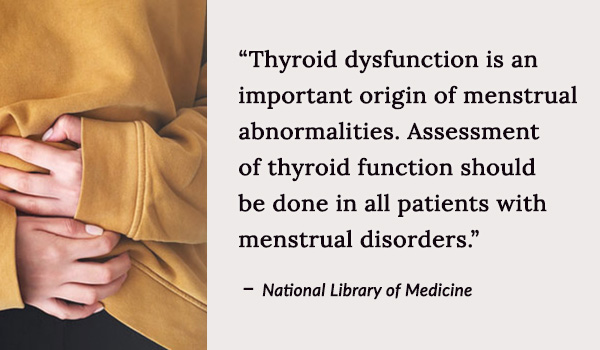Authored by Dr. Sarika Arora, MD
Thyroid hormones affect every system in your body — even your reproductive system. And because thyroid hormones are so tuned-in, a thyroid imbalance has a domino effect that can throw off all the other endocrine systems in your body, too.

That’s why when a woman comes to me looking for help with irregular periods, I make sure to check her thyroid.
How thyroid hormones affect the menstrual cycle
There’s a lot of evidence that poor thyroid function — whether it’s too low (hypothyroidism) or too high (hyperthyroidism) — can throw off women’s reproductive cycles. In women of all ages, by far the most common thyroid disorder is hypothyroidism. But hyperthyroidism, while much less common, can have a powerful impact, too.
Our common belief is that our ovaries and uterus regulate our menstrual cycle. But thyroid hormones regulate many different aspects of the reproductive cycle too — including pregnancy. Both hypothyroidism and hyperthyroidism affect the production of the key sex hormones that drive the menstrual cycle — estrogen, luteinizing hormone(LH), follicle-stimulating hormone (FSH) and progesterone.
What happens in a normal menstrual cycle?
In a normal menstrual cycle, levels of estrogen rise in the follicular phase (the two weeks after the woman’s period), peaking at around day 12 before falling sharply. Levels of LH and FSH peak just before ovulation, around day 13.
The second or luteal phase of the cycle begins at ovulation. That’s when progesterone levels begin to rise, peaking at around day 21, and (unless the woman is pregnant) falling back down to original levels at around day 28, when she menstruates.
Estrogen levels bottom out just after ovulation, rise again to a second but somewhat lower peak at day 21, and then like progesterone decline to their lowest point at day 28.

But with hypothyroidism, there are key changes in these hormones:
1. Production of estrogen decreases
2. Production of progesterone decreases or stays unchanged
3. LH and FSH both decrease
Irregular periods and hypothyroidism
When the balance of these four key hormones becomes impaired, your menstrual cycle can be disrupted in several ways:
- Prolonging the duration of menstruation (often also causing heavier menstrual blood loss or menorrhagia, which puts further stress on the body)
- Inhibiting the development and release of an ovum (anovulation) with subsequent effects on the later part of the cycle — and preventing fertility
- Creating irregularities in the timing of menstruation, so that the time between one period and the next is never the same.

Irregular periods and hyperthyroidism
As you might guess, the situation is different when the thyroid is overactive — but not in a good way.
One key effect is that estrogen increases in all phases of the menstrual cycle — as much as 2 to 3 times higher, according to some studies. And FSH and LH levels are often significantly higher as well.
At the same time, progesterone levels fall in many women. This can stop ovulation as well as prevent the build-up of the uterine lining needed to receive and support a fertilized ovum.
Women who suffer from hyperthyroidism often stop menstruating altogether (amenorrhea) or have short, light periods. They are also likely to experience infertility. As a side note, hyperthyroid women also see an increase in androgens like testosterone, which exacerbates the problems related to excess thyroid hormones.
What to do if you suspect thyroid dysfunction
If you have irregular periods and are experiencing any of the symptoms on our hypothyroidism symptoms checklist, you might have a thyroid problem.
When you think about all the different effects a sluggish or overactive thyroid can have — not just on your periods, but on every system in your body — it’s worth the effort to work with a trusted healthcare provider to identify and correct any imbalances in your thyroid.
 | Many natural therapies help restore hormonal balance. Get started with our article Five steps for natural thyroid symptom relief. |
Davis J, Segars J. Menstruation and Menstrual Disorders: Anovulation. Global Library of Women’s Medicine, 2009. DOI 10.3843/GLOWM.10296
Jacobson MH, Howards PP, Darrow LA, Meadows JA, Kesner JS, Spencer JB, Terrell ML,Marcus M. Thyroid hormones and menstrual cycle function in a longitudinal cohort of premenopausal women. Paediatr. Perinatal Epidemiol. 2018;32(3): 225-234.
Jefferys A, Vanderpump M, Yasmin E. Thyroid dysfunction and reproductive health. Obstet. Gynaecol. 2015;17(1): 39-45.
Krassas GE, Poppe K, Glinoer D. Thyroid function and human reproductive health. Endocr. Rev. 2010;31: 702-755.
Walter KN, Corwin EJ, Ulbrecht J, Demers LM, Bennett JB, Whetzel CA, Klein LC. Elevated thyroid stimulating hormone is associated with elevated cortisol in healthy young men and women. Thyroid Res. 2012;5: 13.










